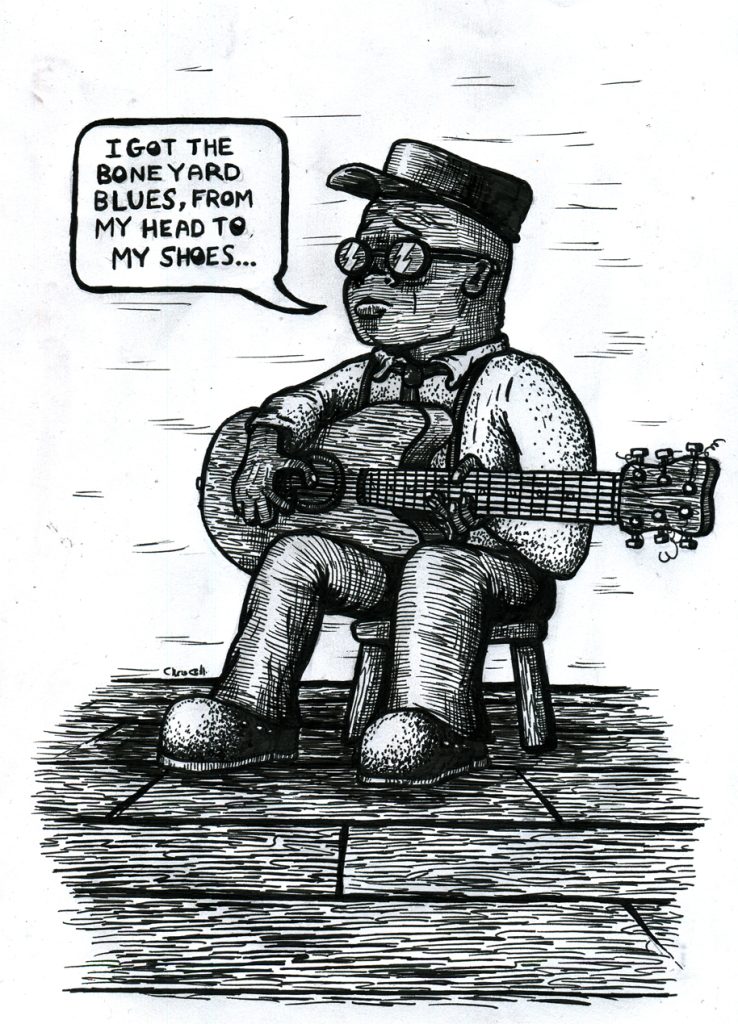Here we are again with another hack piece. Straight from brain to paper. Who knows where we’ll end up this time. Let’s begin with what’s sitting on the table in front of me and take it from there. Im currently sifting through a handful of blues 78s I got handed recently. Among them are some rarities on the Vocation label. And they are in pristine condition , specially for discs that are almost a century old. These are not to be confused with vinyl records. Most collectors are aware of what 78 rpm records are. And non-collectors will surely have crossed paths with them from time to time. You know Those 10″ records with one song per side that seem to break or crack if you look at them the wrong way? Yes, those.
78 rpm records have been around since way back in the 1890’s. For the first while it would have been opera and classical music that went on these discs. Then came the early blues records (or “race” records as they were called in the 1920s and 30s). The market for 78 rpm records today is small, but it’s very intense. Certain copies of the right Blues discs will fetch thousands of quid. Jazz and Country are still hotly collected as well…. Opera and Classical, not so much.
The blues ones, to the right collector, can demand a high price tag. For example, A copy of Tommy Johnson’s “alcohol and jake blues” recently sold for $35,000, the highest price ever paid for any 78rpm. The ones in front of me, alas, are not as desired as that one, although they also aren’t the kind of thing you see every day in your local charity shop.
Many of these kinds of records never made it through the years in good condition. What people don’t understand is playing old 78’s on original windup record players is NOT good for those records. In fact, it is damaging them with each and every play. Those old nails for needles are gouging out the grooves further and further with each play, adding a new level of hiss and distortion and reducing the sound quality. So finding one in pristine condition is a rare find. On top of that, the masters to many of these recordings were often destroyed, so no repressings were made. Any time there is a rerelease of an old blues record, the recording is usually sourced from a pristine copy of a 78rpm, if they can find it, or if they can’t find a clean copy, then a scratchy one will often have to do! A lot of collectors collected these records, not to play them, but to preserve them as a historical document.
It’s a known fact that back in the early 60s, the guitar genius John Fahey regularly got into his car and drove around rural Mississippi, knocking on doors and offering a dollar per disc to anyone who had any of these blues records. In doing so, he managed to amass an outstanding collection of blues 78s. In fact, on occasion he not only traced down certain records, but he traced down the actual artists themselves.
The first one he found was Bukka White. Remember, this was pre Internet and these blues artists were very obscure and there was little written or known about them at the time. Fahey begun his search by following a lyric in one of White’s songs which said “Aberdeen is my home town”. So Fahey wrote a letter addressed to “Booker T White (Old Blues Singer), Aberdeen, Mississippi”, hoping that it might reach the singer. It did. White replied and soon afterwards recorded an LP for Fahey’s Takoma record label and enjoyed success late in his life.
He also found Skip James in a hospital bed in Mississippi. James had recorded only one album in 1931 before giving up on his recording career. By the 1960s, his recordings were some of the rarest of all the classic blues 78s. Fahey was a fanatic, and hit the road with some friends in search of the legendary guitarist. Blindly wandering around the Deep South, they asked the locals if they knew an old blues singer called Skip James until finally they got pointed in the right direction. They eventually found James in a hospital, completely bedridden. They immediately paid his medical bills, put him in the car and brought him to Washington DC to help kick start his career. Despite the help, James never warmed to Fahey from the get go, and the two men often butted heads, later parting ways on bad terms. A clash of egos perhaps. After all, two legends can’t occupy the same space at the same time. It’s against the laws of physics.

